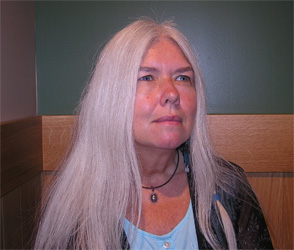 Killing Fields, Ice Storm, Letters from the Dead
Killing Fields, Ice Storm, Letters from the Dead
KILLING FIELDS
You were talking about Indians.
You were avoiding the word that might
slice open your tongue, the softness
Indian boarding school teachers once
would have cut—
for you were the girl who refused
to stop speaking her language.
(Call it your heart song).
You were talking about Indians, snake
dancing around a word buried alive.
You were teaching the poetry to students,
silences written in the hurt tongues
of the hurt Indian poets in the stolen land
renamed America,
when the Cambodian student suddenly
cried how her father stole her and her brother
because their mother feared leaving her country
despite its Killing Fields. The beautiful
student's tears turned everyone into Indians
remembering blood whipping across rivers.
Her voice bled.
We were detained at the border.
My father—tortured for weeks.
My brother and me—locked in cages.
We heard.
(Call it your heart song, call it your heart song).
But you didn't cry. You cut your own tongue
there in the classroom of the United States of America
the woman's relatives tell her she is so lucky to be in,
her earth-skinned face reminding you of a Navaho friend's.
Later you drove north on I-91. Columbus Day
had passed. New England rain was sheering in
but even clouds could not dull blue Berkshires
or Connecticut River sparkling below. Yet
somewhere children were being locked
in cages, parents tortured while knowing
how others had already died.
Genocide. You spoke it out loud in the car.
You cried then. You wept the whole way
to the rented place you call home.
ICE STORM
In the middle of the night she heard it—
low chiming outside, earth music
like crystal wine glasses falling,
delicate shatterings waving empty
across crusted snow.
Maybe she was dreaming
the bell-like breakings, except
sliver of sky shimmered
in the drunk dark, so she thought
her eyes must be open,
she must be awake
beneath fern-green quilt
a mountain grandmother made
decades ago, "geese flying south"
over naked skin,
her nakedness
and that strange ice music
glimmering
like last love, while
on Earth's other side
bombs were falling
on sand and desert city.
A woman lay there, also, listening
to glass shattering, thinking
Maybe I'm dreaming. Praying
she and her babies
breaking
into a thousand pieces
were not really awake,
weeping for her nakedness
to feel her man again
as geese flying south—
In the middle of the night she heard it.
LETTERS FROM THE DEAD
I am dead.
I remember you, though,
flower child of bell bottoms,
beads, who sat by me
in low-ceilinged coffee house,
Foggy Bottom, DC, Fall 1970.
Outside, polluted trees leapt
to blaze in urban lights. Inside,
my West Virginia hair, leaf red,
no longer shone, shaved
from head—and all of me
as if fire shorn
to nakedness.
When you crossed
your legs Indian-style
on the cockroach floor,
tossed hair from face in glints
untamed by comb, I recalled
my bravery of locks rippling long
in Appalachia before they
drafted me.
Your green eyes, hot
as touch, held mine
in candlelight, I trying
not to cry, to act the man
my father yelled at me
to be, the little soldier
obedient
to unfeeling.
Boys don't cry, nor did I
in your girl's greenness.
Your eyes made me miss
my young wife's eyes
in Hungry Hollow, how
they let in the hard
hills and more secret places
of my summer body.
Today you read Newsweek's
"Letters from the Dead,"
glossy spread on the same war.
Same story, same old shit,
except we uniforms die now in sand
instead of jungle. After thirty-six years
you slip into that coffee house
whose blue door you found
down a black alley of piss shadows,
drunks' vomit and disturbed flies.
As in a dream, as in a dream,
once more the flower child you were
occupies quietly an ostracized space
inside that place where the cool people groove
to midnight folk music. But before you,
no leftwing student, no hippie, no professor
spouting Marx, Mao, Marcuse
would sit near me. Yet some wore
Army shirts purchased on the cheap.
I, the universal soldier
the pretty folksinger sings about.
You surprise me with your smile, flashing
a peace sign, diving into a laughter
of flashing rivers. So I buy you peppermint tea.
And I don't cry. I am a man about it,
not knowing if I'll die. You ask,
"Were you drafted like my brothers?"
I choke, "Yeah." I blurt out,
"I'm so lonely. No one talks to me
because I'm in the Army."
Maybe by then I stopped caring
about being a man. Perhaps my lips
trembled. As in a dream, as in a nightmare,
you extend your fingers to my mouth,
press them soft, unsure, as first kisses
to my flesh, both of us from Appalachia,
both Indian, both Irish, both afraid.
You are wondering as you read
"Letters from the Dead" if the name
you never learned is chiseled in a looking glass
of wall. My mountain sister, I'm in Indian country forever.








